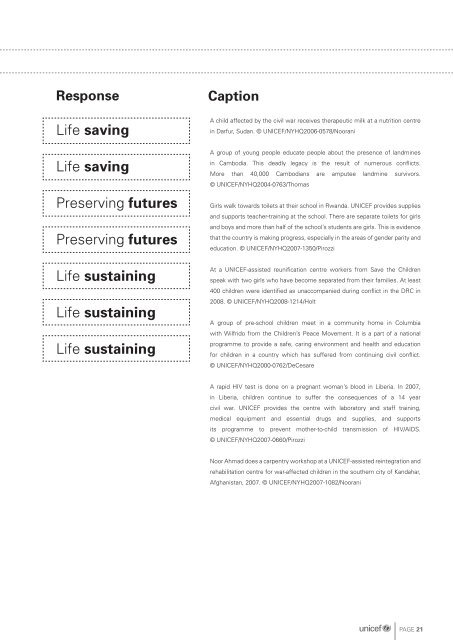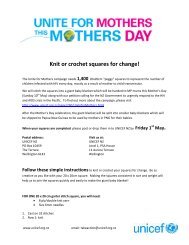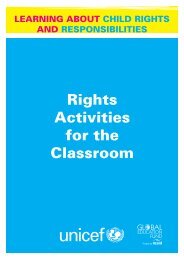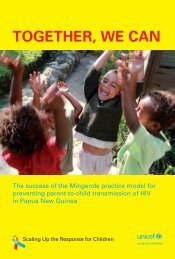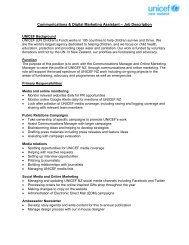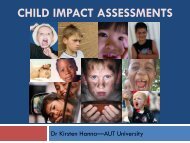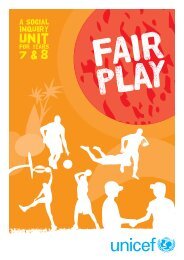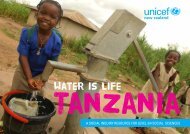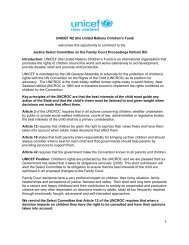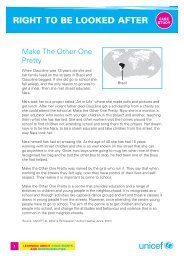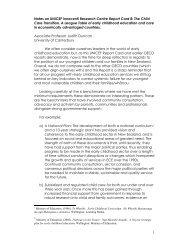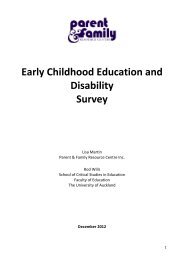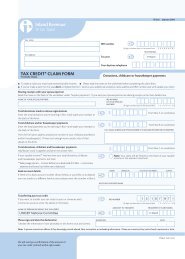Caught in the Crossfire pdf - Unicef
Caught in the Crossfire pdf - Unicef
Caught in the Crossfire pdf - Unicef
You also want an ePaper? Increase the reach of your titles
YUMPU automatically turns print PDFs into web optimized ePapers that Google loves.
Response<br />
Life sav<strong>in</strong>g<br />
Life sav<strong>in</strong>g<br />
Preserv<strong>in</strong>g futures<br />
Preserv<strong>in</strong>g futures<br />
Life susta<strong>in</strong><strong>in</strong>g<br />
Life susta<strong>in</strong><strong>in</strong>g<br />
Life susta<strong>in</strong><strong>in</strong>g<br />
Caption<br />
A child affected by <strong>the</strong> civil war receives <strong>the</strong>rapeutic milk at a nutrition centre<br />
<strong>in</strong> Darfur, Sudan. © UNICEF/NYHQ2006-0578/Noorani<br />
A group of young people educate people about <strong>the</strong> presence of landm<strong>in</strong>es<br />
<strong>in</strong> Cambodia. This deadly legacy is <strong>the</strong> result of numerous conflicts.<br />
More than 40,000 Cambodians are amputee landm<strong>in</strong>e survivors.<br />
© UNICEF/NYHQ2004-0763/Thomas<br />
Girls walk towards toilets at <strong>the</strong>ir school <strong>in</strong> Rwanda. UNICEF provides supplies<br />
and supports teacher-tra<strong>in</strong><strong>in</strong>g at <strong>the</strong> school. There are separate toilets for girls<br />
and boys and more than half of <strong>the</strong> school’s students are girls. This is evidence<br />
that <strong>the</strong> country is mak<strong>in</strong>g progress, especially <strong>in</strong> <strong>the</strong> areas of gender parity and<br />
education. © UNICEF/NYHQ2007-1350/Pirozzi<br />
At a UNICEF-assisted reunification centre workers from Save <strong>the</strong> Children<br />
speak with two girls who have become separated from <strong>the</strong>ir families. At least<br />
400 children were identified as unaccompanied dur<strong>in</strong>g conflict <strong>in</strong> <strong>the</strong> DRC <strong>in</strong><br />
2008. © UNICEF/NYHQ2008-1214/Holt<br />
A group of pre-school children meet <strong>in</strong> a community home <strong>in</strong> Columbia<br />
with Wilfrido from <strong>the</strong> Children’s Peace Movement. It is a part of a national<br />
programme to provide a safe, car<strong>in</strong>g environment and health and education<br />
for children <strong>in</strong> a country which has suffered from cont<strong>in</strong>u<strong>in</strong>g civil conflict.<br />
© UNICEF/NYHQ2000-0762/DeCesare<br />
A rapid HIV test is done on a pregnant woman’s blood <strong>in</strong> Liberia. In 2007,<br />
<strong>in</strong> Liberia, children cont<strong>in</strong>ue to suffer <strong>the</strong> consequences of a 14 year<br />
civil war. UNICEF provides <strong>the</strong> centre with laboratory and staff tra<strong>in</strong><strong>in</strong>g,<br />
medical equipment and essential drugs and supplies, and supports<br />
its programme to prevent mo<strong>the</strong>r-to-child transmission of HIV/AIDS.<br />
© UNICEF/NYHQ2007-0660/Pirozzi<br />
Noor Ahmad does a carpentry workshop at a UNICEF-assisted re<strong>in</strong>tegration and<br />
rehabilitation centre for war-affected children <strong>in</strong> <strong>the</strong> sou<strong>the</strong>rn city of Kandahar,<br />
Afghanistan, 2007. © UNICEF/NYHQ2007-1082/Noorani<br />
PAGE 21


